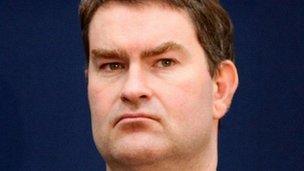'Cowboy' tax scheme firms 'to disclose client lists'
- Published
- comments

David Gauke said the UK had an excellent record on clamping down on avoidance schemes
The government is promising to force "cowboy" financial firms to disclose the names of people using "aggressive" tax avoidance schemes.
Treasury minister David Gauke said such products were "repugnant" and unfairly penalised ordinary taxpayers.
The proposal is part of a government consultation on curbing avoidance.
Later, Mr Gauke said householders who paid tradesmen in cash were morally wrong as they were "facilitating the hidden economy".
Tuesday's <link> <caption>Daily Telegraph</caption> <url href="http://www.telegraph.co.uk/finance/personalfinance/consumertips/tax/9421590/Middle-classes-who-pay-cash-in-hand-morally-wrong-and-aiding-law-breaking-says-minister.html" platform="highweb"/> </link> quotes Mr Gauke as saying: "Getting a discount with your plumber by paying cash in hand is something that is a big cost to the Revenue and means others have to pay more in tax.
"I think it is morally wrong. It is illegal for the plumber but it is pretty implicit in those circumstances that there is a reason why there is a discount for cash. That is a large part of the hidden economy."
Mr Gauke told Mondays BBC's Newsnight programme: "When a tradesman says 'here's a 10%, a 20% discount on your bill if you pay me cash in hand' that is... as a big a problem in terms of loss to the Exchequer as tax avoidance.
"Revenue is not being paid as it should be paid... If people do that, they have to do so with the recognition that it means taxes will be higher for the rest."
Last month Prime Minister David Cameron condemned the use by comedian Jimmy Carr of a Jersey-based scheme as "morally wrong".
That was one of a number of high-profile cases of people using financial loopholes to legally avoid large tax bills.
The Treasury estimates that 14% of all unpaid tax income is due to aggressive avoidance schemes, which are not illegal but are deemed unfairly to deprive the government of income.
The proposals include:
Measures to make finance companies disclose details of wealthy clients who take advantage of such schemes
Firms having to disclose how all their tax avoidance schemes work, not just the ones for which they are being criticised
Publishing warnings about tax avoidance schemes that are effectively being mis-sold, to make it easier for taxpayers to identify when they are on the receiving end of a hard sell by a disreputable promoter
They comes alongside plans to legislate to curb tax avoidance through a general anti-avoidance rule.
Companies could face fines of more than £1m if they flout the new rules.
Mr Gauke acknowledged that tax avoidance - which is legal, unlike tax evasion - was difficult to define, adding that there was "always a barrier to be put up between unfairness and clarity".
He defined "aggressive" schemes as those which are "contrived" to defy the will of Parliament by depriving the government of expected revenues. He promised to "strengthen our description" of what constitutes tax avoidance to make schemes easier to control.
In a speech to the Policy Exchange think tank, Mr Gauke said HM Revenue and Customs already had an "excellent compliance record", adding: "We are building on the work we have already done to make life difficult for those who artificially and aggressively reduce their tax bill.
"These schemes damage our ability to fund public services and provide support to those who need it. They harm businesses by distorting competition. They damage public confidence.
"And they undermine the actions of the vast majority of taxpayers, who pay more in tax as a consequence of others enjoying a free ride."
He promised to deal with "cowboy advisers", who devise and sell schemes to divert money away from the Exchequer.
Mr Gauke told the BBC News Channel: "This is a message to people who might be tempted by an unfair tax avoidance scheme: if something looks too good to be true, it probably is too good to be true.
"It's unfair because other taxpayers are having to pay more as a consequence... We want to nip it in the bud and ensure that people don't get engaged in aggressive tax avoidance schemes."
Mr Carr last month confirmed making a "terrible error of judgement" after it emerged he used a complex scheme to reduce his tax bill.
- Published22 July 2012
- Published21 June 2012
- Published17 July 2012
- Published24 June 2012
- Published21 June 2012
- Published21 June 2012